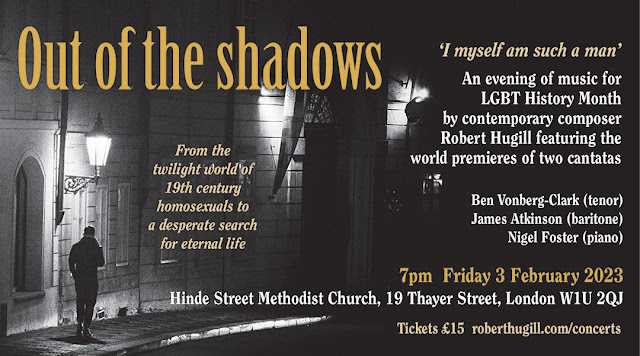During Lockdown in 2020, I had a tendency to reread old books and revisit old musical projects. One project resulted in the creation of my cantata Et expecto resurrectionem as I returned to an early, incomplete musical project [see my article 'In search of eternal life'].
One of the books I was re-reading, a history of gay life during the 19th century set me thinking. When reading books, if texts draw me in and elicit musical ideas, then I tend to scribble in the book. In this case, I accumulated a selection of texts which seemed to tell a story of the gradual emergence of gay men into society. The idea of a song cycle was born.
Usually, when writing song cycles, I put the texts into some sort of order and then simply start work on the music. My music writing tends to be instinctive; I simply see what happens and whether I like it. But this time, I reflected on the way the distinguished song composer Ian Venables commented to me that he tended to plan song cycles to ensure structural coherence and variety. I decided to see what happened if I did this.
I assembled five texts and assigned them a particular musical mood and rough tempo. The result would have, I hoped, a satisfying sort of symphonic layout in terms of Introduction, Allegro, slow movement, scherzo and finale. At the same time, I planned the allocation of parts. My cantata Et expecto resurrectionem had developed into a single continuous work for tenor, baritone and piano with little in the way of independent solo moments. For the new piece, which would become Out of the Shadows, I decided to alternate ensemble moments with solos.
I am never very good at sticking to plans for pieces of music, but by and large, Out of the Shadows remains true to this initial plan.
- I myself am such a man sets text from Carlus Pontus Wikner's Psychological Confessions (1879) for both soloists as a slow introduction, reflecting Wikner's rather anguished admission of same-sex attraction.
- They lived together and seldom parted sets text from Friedrich van Ramdohr's Venus Urania (1798) as a tenor solo which has a slightly skittish element to the description of two rather naive young men who are horrified to realise their mutual attraction.
- The Ideal Friend sets a text by Joe Ackerley from My Father and Myself (1968) for both soloists. This is actually a 20th century description of cruising, but it takes place at a time when homosexuality was still proscribed and probably is equally true for 19th century gay men. This was intended to be the slow movement, but ended up rather more walking pace rather aptly as Ackerley's text describes his protagonist (Ackerley himself) walking along observing a young man to whom he is attracted.
- The Bath House takes text from Mikhail Kuzmin from around 1905. This was intended as a baritone solo, a sort of scherzo but as I set the text, I decided to give the bath house attendant his own life and brought in the tenor soloist to, I hope, comic effect.
- For the final movement, I wanted a text that had an element of positive affirmation about it. I ended up with Walt Whitman's To what you said, perhaps best known from Bernstein's setting in Songfest. They are words which Whitman penned to a female admirer but which contain a real affirmation of what it was to be a man loving men, 'I am he who kisses his comrade lightly on the lips at parting, and I am one who is kissed in return'


.jpg)



.jpg)





No comments:
Post a Comment